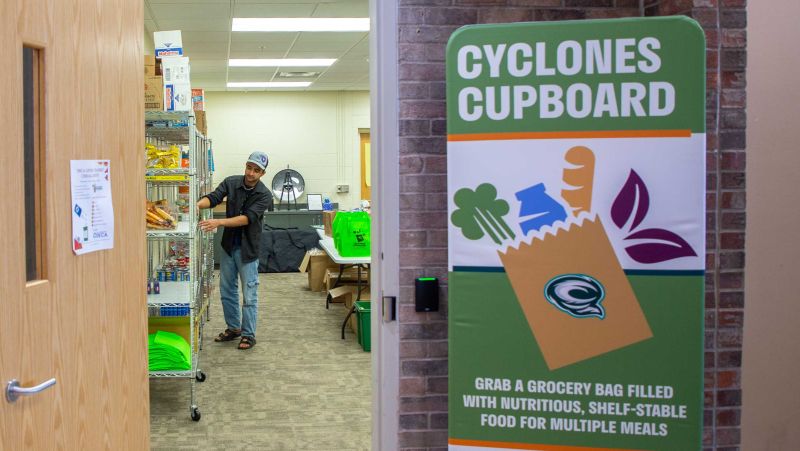
A better job, a better future, a better way of life. But what happens when you get stuck along the way?
About half of those who attend St. Cloud Technical & Community College (SCTCC) are working on their general classes so they can transfer for a bachelor’s degree. Starting at SCTCC saves money on tuition while taking classes at a small campus with more personalized attention from instructors and professional staff.
The other half are taking classes for a two-year degree (associate of applied science) to enter a professional or trades career quickly. These careers pay well, offer pathways to advancement, and provide opportunities for improving their economic status.
Deciding on College
Thought processes behind the decision to come to SCTCC are different for each student, but there are a lot of barriers to starting college, some out of the College’s control (like the FAFSA), and some that are.
One thing we know is our students face many challenges when they decide to attend SCTCC: more than half are first-generation; many are low-income; they are working full-time, part-time, two jobs; and others that are too many to name. The College welcomes all students—whatever their barriers—with an open-access acceptance, allowing anyone to go to college to better their future.
Over the past 10 years, SCTCC has improved or implemented many initiatives to support students as they navigate the college experience, including personalized advising, mental health services, a Multicultural Center, resource support for basic needs, emergency grants, and the Cyclones Cupboard food pantry.
Of these support services available to every SCTCC student, the Cyclones Cupboard stands out, as it was created by focusing on data-based needs and championed by students.
About the Cupboard
In 2018, SCTCC administered the Hope Center Student Basic Needs Survey to its students, which raises awareness of the prevalence of basic needs insecurities on college campuses. With data from the survey, colleges and universities can improve their services.
What the College learned in 2018 was startling: 44% of respondents were food insecure in the past 30 days; 48% worried their food would run out before they were able to buy more; and 68% reported food insecurity, housing insecurity, or homelessness in the past year.
With 504 respondents, this was a sound cross-section of the student body. The SCTCC Student Senate saw these results and partnered with LeadMN to enact change. They worked with Campus Life and other SCTCC departments, and in 2019, Cyclones Snacks was launched. Shelving was located in various parts of the College where students could grab a quick granola bar, fruit cup, or cup-o-soup on the go.
Still, a more permanent solution was needed. After assessing other Minnesota colleges’ food pantries, SCTCC used Covid relief funds to launch the Cyclones Cupboard food pantry in 2022. Students now had a permanent place to pick up nutritious meal options and hygiene products—and it was available to all students, no matter their food security status.
The Cyclones Cupboard Makes a Difference
In the four years since the Cupboard opened, Director of Campus Life Shaun Keeley has been diligent in making sure students are aware of it and that it’s easy to access. Drop-in hours are available every day of the week, and students can request food online for pickup.
The Cupboard isn’t intended to be a long-term food solution for students, but it does provide opportunities to talk about options like basic needs, SNAP benefits, and how to get in touch with SCTCC’s Resource Support Manager.
Has it made a difference? Absolutely. Now that the Cupboard has been open for nearly four years, food insecurity in SCTCC students has decreased by 10% per a Hope survey in 2024. That still leaves almost a third of our students insecure, but it does show that the work of the Cupboard is making a noticeable difference.
What’s Next?
The work doesn’t stop. With increased inflation, a tight job market, and changes in financial aid allocations, money for basic needs is spread even more thinly for students.
“We’re seeing increases in needs, as well as requests for assistance across all basic needs,” Keeley said. “We’re exploring how to provide more for our students and how can we expand.”
Some of the ideas on the table are keeping more non-perishables in stock, satellite options in all buildings on campus, making it more convenient for students, and bringing in more donations.
Another major boost happened just last month in October: Keeley got notice that SCTCC was a recipient of the Hunger Free Campus Grant to the tune of $12,500. The grant was a result of a bill passed in the state of Minnesota in 2019, one of 11 states to pass a Hunger Free Campus bill.
The grant has a 50% match, but his goal is to match it 100%. The dollars from the grant will be able to address barriers like keeping more food stocked on shelves, as well as promoting food insecurity events and updating infrastructure. After SCTCC submits its end-of-year report, the College will be designated a Hunger Free Campus, allowing Keeley to apply for a Sustaining Designation Grant.
To the Future
SCTCC has come a long way since its 2018 Hope Survey. With increased assistance from the grant, the Cyclones Cupboard can only become more robust, for all students and their futures.
“Every little bit we can do helps our students achieve more, find success inside and outside the classroom, reduce stigma around food insecurity, and supplement their needs,” noted Keeley. “It’s incredibly rewarding work to hear from our students about how impactful it is, to hear their gratitude for having this on campus.”
You can learn more and find information on how to donate at the Cyclones Cupboard page.